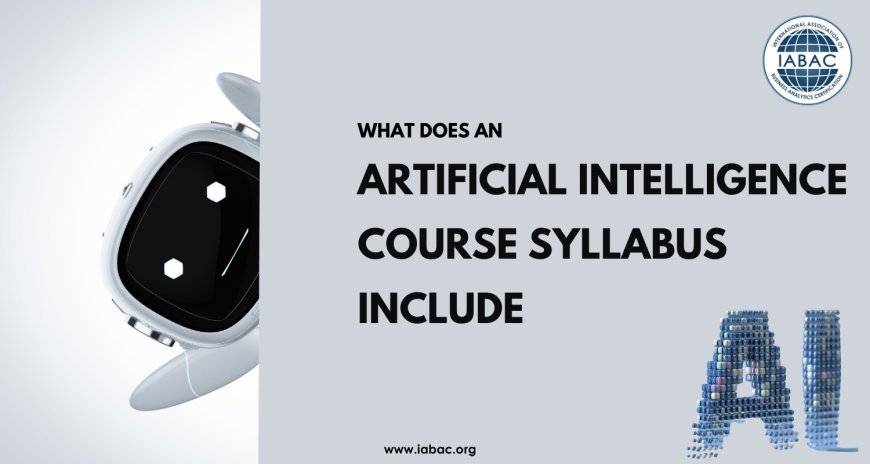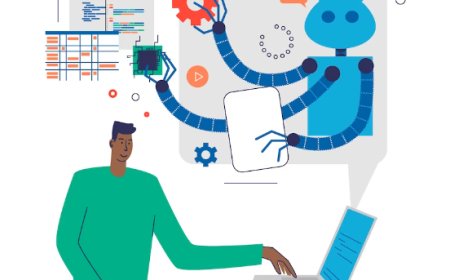What Does an Artificial Intelligence Course Syllabus Include
Explore what an AI course covers: key topics, applications, and skills to master AI. Learn about essential AI concepts and practical skills.

An artificial intelligence course syllabus aims to give students the basic knowledge and practical skills they need to succeed in the field. It 000covers various topics like machine learning algorithms, neural networks, natural language processing, and robotics. These courses are designed to balance theory with hands-on practice, so you're ready to tackle problems. A good AI syllabus also includes sections on data science certifications, which prove you can handle big data and find useful insights from it. Business analytics certifications are often part of AI courses, showing how AI and business strategy work together to help companies grow and work more efficiently.
Many AI programs also offer artificial intelligence certifications when you finish, proving your skills and dedication to potential employers. These certifications are highly respected and can boost your job opportunities. If you want to specialize, you can also get certifications in data analytics or become a machine learning expert to focus on the areas that interest you most. An artificial intelligence course syllabus is like a roadmap to becoming an AI expert. By covering all the important topics and offering certifications, these courses get you ready for the growing demand in the field. Whether you want to focus on machine learning or business analytics, understanding what's in an AI syllabus is the first step to a great career in artificial intelligence.
Exploring Artificial Intelligence Course Syllabi
Artificial Intelligence (AI) is quickly changing many industries. Businesses and industries are using AI technologies like machine learning, robotics, deep learning, neural networks, and natural language processing. This has made many people want to learn more about AI. Institutes and online platforms are offering many AI courses. These courses cover basic AI and machine learning, as well as advanced topics like robotics and deep learning. A typical artificial intelligence course syllabus includes sections on neural networks, natural language processing, and practical AI uses. Interest in AI isn't just for tech fans. People from different fields are taking AI courses to get better skills and stay competitive at work. This shows how important AI is for the future of work and new ideas.
Challenges in Understanding AI Education Courses
Understanding AI education can be difficult. AI is changing fast, and it's hard to keep up. Choosing the right courses is crucial but not simple.
1. Variety of Courses: There are many AI courses available, which makes it hard to choose the right one. Each course covers different things.
2. Quality of Content: Making sure that the course has good content is important. Some courses might not cover everything you need.
3. Prerequisites: Many AI courses need you to know math, programming, and data science well. Not everyone has these skills, which can make it hard to start.
4. AI Course Outline: The course outline changes a lot between institutes. It's tough to compare them and know which course is best for you.
5. Keeping Up: AI changes quickly. Courses need to update all the time to stay good, but not all do. Some courses might have old information.
6. Cost: Good AI education can cost a lot. It's hard to balance the cost with how good the education is.
What topics does an artificial intelligence course cover?
1. Artificial Intelligence:
-
Learn about AI, its history, and basic ideas.
2. Machine Learning Basics:
-
Understand algorithms, supervised and unsupervised learning, and neural networks.
3. Data Mining and Data Science:
-
Methods for finding insights from data.
4. Natural Language Processing (NLP):
-
Teach computers to understand and use human language.
5. Computer Vision:
-
Analyze images and videos, recognize objects, and use AI for visual tasks.
6. Robotics and Automation:
-
Use AI in robots, industrial automation, and self-operating systems.
7. Ethical and Social Issues:
-
Discuss AI ethics, biases, privacy, and how AI impacts society.
8. Advanced Topics:
-
Deep learning, reinforcement learning, and AI in specialized fields.
9. Practical Applications and Examples:
-
Real-world projects applying AI techniques.
10. Future Trends in AI:
-
New AI technologies, research areas, and career opportunities in AI.
These topics make up an artificial intelligence course syllabus, preparing students for various applications and challenges in the field.
What Does an Artificial Intelligence Course Syllabus Include?
Artificial intelligence (AI) is changing industries and shaping the future of technology. To learn AI well, taking a good course is important. A good artificial intelligence course syllabus covers many important parts that help students learn the skills and knowledge they need. Here are the main parts you can expect:
1. Introduction to AI
-
Learn about AI history and how it has changed.
-
Understand AI words and ideas.
-
See how AI is used in real life.
2. Math and Statistics for AI
-
Basics of math like algebra and calculus.
-
Basics of statistics and chance.
-
Why math is important for AI.
3. Coding Skills
-
Start coding with languages like Python.
-
Write and fix code.
-
Do coding tasks and projects.
4. Machine Learning
-
Learn about supervised and unsupervised learning.
-
Key ideas like decision trees and neural networks.
-
Use cases and real-life studies.
5. Deep Learning
-
Learn about neural networks and how they work.
-
Use CNNs for pictures and RNNs for lists of data.
6. Natural Language Processing (NLP)
-
Basics of NLP and why it's important.
-
Ways to work with words and feelings in text.
-
Use NLP in real life.
7. AI Ethics and Rules
-
Think about ethics in making and using AI.
-
Fairness and bias in AI systems.
-
Rules and ways to make AI safe.
8. AI Tools and Frames
-
Learn tools like TensorFlow, Keras, and PyTorch.
-
Use tools to make and train models.
-
Compare different tools.
9. Big Project
-
Use what you learned in a real project.
-
Make a project from getting data to using the model.
-
Show and test the project.
10. Trends in Business
-
What's new in AI and what's next?
-
Learn from people in business and special talks.
-
Meet people who work in AI.
This course plan helps students learn AI ideas and tools they need. If you want more about AI courses, go to the IABAC site domain.
An Artificial Intelligence course covers a wide range of topics to give a complete understanding of AI. It starts with basics like machine learning and deep learning and goes into more advanced areas such as natural language processing and robotics. Hands-on projects and real-life examples are included so students can apply what they learn in practical situations. This prepares them for various careers in the fast-changing field of artificial intelligence.











































